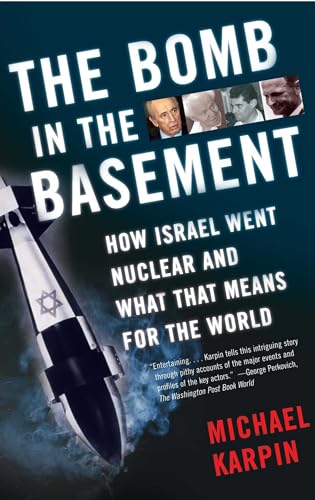Items related to The Bomb in the Basement: How Israel Went Nuclear and...

After Israel won its war of independence in 1948, founding prime minister David Ben-Gurion realized that his country faced the possibility of having to fight Arab nations again in the future. He embraced the idea of developing a nuclear capability and put a young lieutenant, Shimon Peres, in charge of the project. This was the beginning of Israel's quest for nuclear capability, a project that could not have happened without the cooperation of the French. In The Bomb in the Basement, journalist Michael Karpin gives us the most complete account of how Israel became the Middle East's only nuclear power and how its status as an officially unacknowledged nuclear nation affects the politics of that volatile region.
Karpin's research includes exclusive interviews that provide new insights into the key figures behind the program (notably a harsh rivalry between Peres and Isser Harel, the first head of Mossad). He explains how different U.S. administrations have dealt with Israel's nuclear status, from Eisenhower's disapproval to Johnson's open support. And he shows how the key to Israel's nuclear capability has been its policy of "nuclear ambiguity."
A compelling account of a complicated history, The Bomb in the Basement raises provocative questions about how Israel's nuclear arsenal may affect not only its own future, but the future of the entire Middle East.
"synopsis" may belong to another edition of this title.
Copyright 2006, The Washington Post. All Rights Reserved.
"About this title" may belong to another edition of this title.
- PublisherSimon & Schuster
- Publication date2007
- ISBN 10 0743265955
- ISBN 13 9780743265959
- BindingPaperback
- Number of pages416
- Rating
Buy New
Learn more about this copy
Shipping:
US$ 2.64
Within U.S.A.
Top Search Results from the AbeBooks Marketplace
Bomb in the Basement : How Israel Went Nuclear And What That Means for the World
Book Description Condition: New. Seller Inventory # 4299007-n
The Bomb in the Basement: How Israel Went Nuclear and What That Means for the World (Paperback or Softback)
Book Description Paperback or Softback. Condition: New. The Bomb in the Basement: How Israel Went Nuclear and What That Means for the World 1.35. Book. Seller Inventory # BBS-9780743265959
The Bomb in the Basement: How Israel Went Nuclear and What That Means for the World
Book Description Paperback. Condition: new. New. Fast Shipping and good customer service. Seller Inventory # Holz_New_0743265955
The Bomb in the Basement: How Israel Went Nuclear and What That Means for the World by Karpin, Michael [Paperback ]
Book Description Soft Cover. Condition: new. This item is printed on demand. Seller Inventory # 9780743265959
The Bomb in the Basement: How Israel Went Nuclear and What That Means for the World
Book Description Condition: New. Seller Inventory # ABLIING23Feb2416190145038
The Bomb in the Basement: How Israel Went Nuclear and What That Means for the World
Book Description Condition: New. Seller Inventory # I-9780743265959
The Bomb in the Basement: How Israel Went Nuclear and What That Means for the World
Book Description Paperback. Condition: new. Buy for Great customer experience. Seller Inventory # GoldenDragon0743265955
The Bomb in the Basement: How Israel Went Nuclear and What That Means for the World
Book Description Paperback. Condition: New. Brand New! This item is printed on demand. Seller Inventory # 0743265955
The Bomb in the Basement: How Israel Went Nuclear and What That Means for the World
Book Description Paperback. Condition: new. New. Seller Inventory # Wizard0743265955
The Bomb in the Basement (Paperback)
Book Description Paperback. Condition: new. Paperback. As Iran continues to develop its nuclear program and explicitly denounces Israel, Michael Karpin's The Bomb in the Basement provides important context for the ongoing tensions in the Middle East. After Israel won its war of independence in 1948, founding prime minister David Ben-Gurion realized that his country faced the possibility of having to fight Arab nations again in the future. He embraced the idea of developing a nuclear capability and put a young lieutenant, Shimon Peres, in charge of the project. This was the beginning of Israel's quest for nuclear capability, a project that could not have happened without the cooperation of the French. In The Bomb in the Basement, journalist Michael Karpin gives us the most complete account of how Israel became the Middle East's only nuclear power and how its status as an officially unacknowledged nuclear nation affects the politics of that volatile region. Karpin's research includes exclusive interviews that provide new insights into the key figures behind the program (notably a harsh rivalry between Peres and Isser Harel, the first head of Mossad). He explains how different U.S. administrations have dealt with Israel's nuclear status, from Eisenhower's disapproval to Johnson's open support. And he shows how the key to Israel's nuclear capability has been its policy of "nuclear ambiguity." A compelling account of a complicated history, The Bomb in the Basement raises provocative questions about how Israel's nuclear arsenal may affect not only its own future, but the future of the entire Middle East. Karpin presents the untold story of how Israel became the Middle East's only nuclear power, how unlike Iran and Iraq it kept its atomic program secret, and how the Israeli bomb shapes the politics of the world's most volatile region. This item is printed on demand. Shipping may be from multiple locations in the US or from the UK, depending on stock availability. Seller Inventory # 9780743265959

